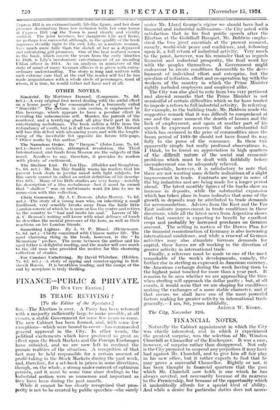FINANCE-PUBLIC & PRIVATE.
[BY OUR CITY EDITOR.]
IS TRADE REVIVING ?
[To the Editor of the Spectator.] Sra,—The Election is over. A Party has been returned with a majority sufficiently large to make possible, at all events, a stable Government for some few years to come. The new Cabinet has been formed, and, with some few exceptions—which were bound to occur—has cenunanded general approval in the City. In other words, the political excitements which have produced so great an effect upon the Stock Markets and the Foreign Exchanges- have subsided, and we are now left to confront the prosaic realities of the situation. A recognition of that fact may be held responsible for a certain amount of profit-taking in the Stock Markets during the past week, and, therefore, for a set-back in- prices in some directions, though, on the whole, a strong under-current of optimism persists, and it must be some time since dealings in the Industrial section were so numerous and important as they have been during the past month. While it cannot be- too clearly Tecognized that pros- perity is not be created by public speeches—else surely under Mr. Lloyd George's regime we should have had a financial and industrial millennium—the City noted with satisfaction that in his first public speech after the Election at the Guildhall Banquet, Mr. Baldwin empha- sized the two great essentials at the present moment, namely, world-wide peace and confidence, and, following upon it, a full return of industrial activity. Very much to the point, however, was his reminder that as regards - financial and industrial prosperity, the final word lay with the peoples themselves. A Government might endeavour to create conditions favourable -to the deve- lopment of individual effort and enterprise, but the question of initiation, effort and co-operation lay with the workers of the country in which the Prime Minister rightly included employers and employed alike. The City was also glad to note from two very pertinent and shrewd remarks that the Prime Minister is not unmindful of certain difficulties which so far have tended - to impede a return to full industrial activity. In referring; for example, to the building trade, Mr. Baldwin made-the suggestive remark that it was difficult to comprehend at one and the same moment the dearth of houses and the lack of employment, and again at another part of his speech he expressed concern that the substantial fall which has occurred in the price of commodities since the boom period of 1919-20 should not have found its- way fully to the purse of the consumer. In these two apparently simple but really profound observations is, I think, to be found an appreciation in high quarters of the difficult nature of the social and economic problems which must be dealt with faithfully before unemployment can be adequately relieved. Meanwhile,. however, it is satisfactory to note that there are not wanting some definite indications of a slight: improvement in trade. Contracts are larger in some of the big industries and are being made for a longer period ahead. The latest monthly figures of the banks show an. increase in deposits, while the substantial expansion which has taken place in loans indicates that some of the growth in deposits may be attributed to trade demands for accommodation. Advices from the East and the Far East indicate improvement in trade conditions in those directions, while all the latest news from Argentina shows that that country is expecting to benefit by excellent crops and probably by increased purchases on German account. The setting in motion of the Dawes Plan for the financial reconstruction of Germany is also increasing international confidence, and while- a renewal of German activities may also stimulate German demands for capital, these forces are all working in the direction of greater activity in international trade. Finally, a reference must be made to one of the most remarkable of the week's developments, namely, the further rise in sterling as expressed in American currency, the American exchange during the week having risen to the highest point touched for more than a year past. It remains to be seen whether we are approaching the time when sterling will approach the dollar parity ; but, at all events, it would seem-that we are shapmg for conditions making the exchanges of a more stable character, and if that occurs we shall have one of the most powerful factors making for greater activity in international trade generally.—I am, Sir, yours faithfully, The City, ,November 12th.
ARTIIUR W. KIDDY.










































 Previous page
Previous page